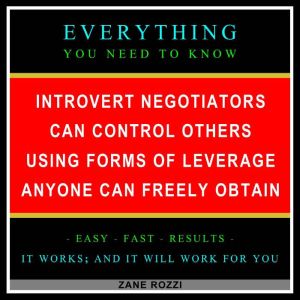
List: $12.99
| Sale: $9.10
Club: $6.49
Introvert Negotiators Can Control Others Using Forms of Leverage Anyone Can Freely Obtain
Everything You Need to Know - Easy Fast Results - It Works; and It Will Work for You
Author: Zane Rozzi
Narrator: Zane Rozzi
Unabridged: 2 hr 39 min
Format: Digital Audiobook Download
Publisher: Zane Rozzi
Published: 07/06/2022
Category: Business & Economics - Negotiating
Synopsis
Leverage is often the primary factor that moves negotiated outcomes in favor of one party at the expense of the other party. Leverage in negotiations is the power that one party has to influence - or control - the other party to the negotiation. Leverage is, therefore, incredibly important in determining the outcome of the negotiation.If you think of a negotiation as dividing up a pie, leverage is, in fact, so powerful that someone with very poor negotiating skills, but who holds a lot of leverage, can often obtain the biggest piece of the pie - or even most of the pie - despite having very poor negotiating skills. Should a negotiator have both excellent negotiating skills and substantial leverage, that negotiator will easily dominate the negotiation.Which party has the stronger influence or control over the other party can shift throughout the negotiation. Leverage is also not consistent with respect to all issues of the negotiation. You could have a lot of leverage in one area of the negotiation, but very little leverage in other areas of the negotiation. You might also have a lot of leverage over some specific individual members of the other team, but hardly any leverage over other specific individual members of the other team. You must, therefore, strategically apply your leverage in the way that maximizes your control of the negotiation.Throughout this book, we'll discuss many ways you can both increase your leverage and decrease the other party's leverage. There are many different sources of leverage that can be easily gained or lost through your actions or the actions of the other party.You'll be able to start applying what you've learned immediately after you've finished reading this book by using the example procedures, responses, strategies, behaviors, and action steps. It works; and it will work for you. Read this book, apply the information, and see for yourself.